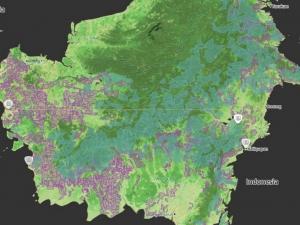
Frequent flooding and critically low crop yields are just two of the warning signs of climate change in Indonesia, home to the world’s third-largest tropical rainforest and some of the highest levels of biological diversity on the globe.
To shed light on these crucial issues, data journalists have launched the news site Ekuatorial, which offers the latest environmental news and engaging, easy-to-understand interactive maps of oceans, forests and natural disasters in Indonesia.
Last month, when heavy rains hit Jakarta, Ekuatorial worked with Indonesian Humanitarian OpenStreetMap, a volunteer group that assists in the collection of geographic data during and following humanitarian disasters. That group was also working with the local government disaster management organization BPBD. They quickly passed along local data to the Ekuatorial team, which used it to create a multi-layered map.
The Society of Indonesian Environmental Journalists (SIEJ) and Internews’ Earth Journalism Network (EJN) created Ekuatorial with technical assistance from ((o))EcoLab, founded by ICFJ Knight International Journalism Fellow Gustavo Faleiros. It also received financial support from the David and Lucile Packard Foundation. Ekuatorial is powered by JEO, an open source WordPress theme and geojournalism platform created by ((o))EcoLab.
Read the complete post on IJNet.
The International Journalists' Network, IJNet, keeps professional and citizen journalists up to date on the latest media innovations, online journalism resources, training opportunities and expert advice. ICFJ produces IJNet in seven languages: Arabic, Chinese, English, Persian, Portuguese, Russian and Spanish. IJNet is supported by donors including the John S. and James L. Knight Foundation.